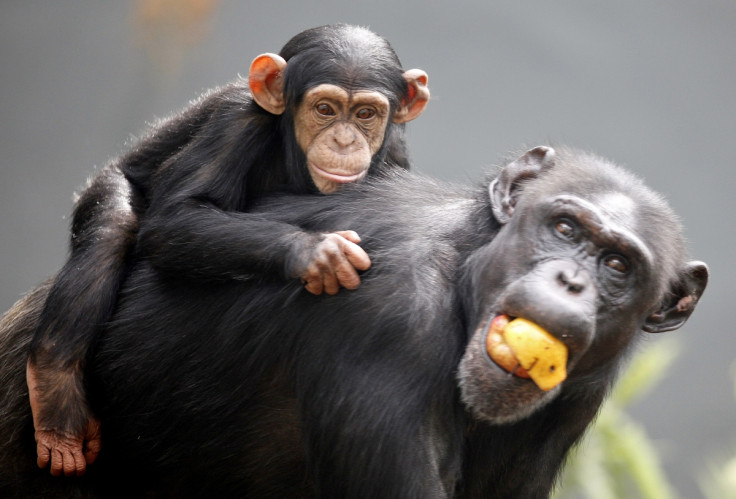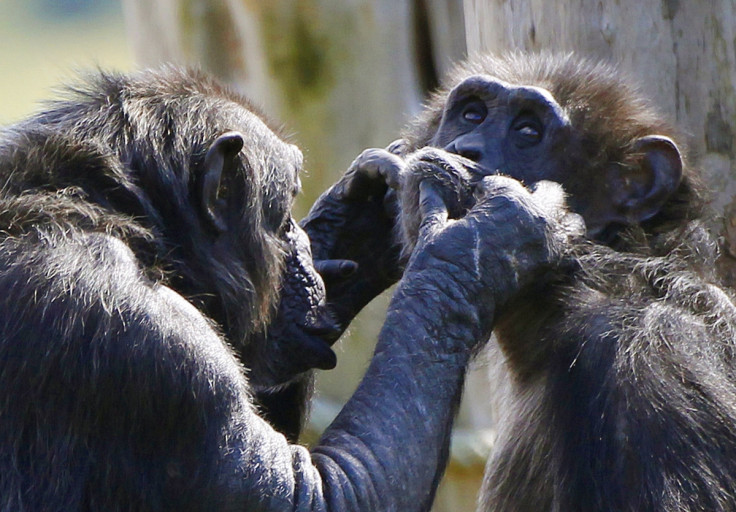Chimpanzees can't learn foreign languages: Study challenged following review

Chimpanzees cannot learn the "foreign languages" of different populations, altering their own sounds to communicate with new chimps. A team of scientists came to this conclusion following a review of a study published in the journal Current Biology, which claimed chimps can learn each others' language.
The original study examined two sets of chimps in Edinburgh Zoo. One had been captive for several years, while the other has recently arrived from a zoo in the Netherlands. Over three years, the team monitored their sounds and said that over this period, the Netherlands chimps altered their calls to match the Edinburgh group when communicating about a common object. The team said this was the result of learning a new shared vocalisation.
"We found that, following the integration of two groups of adult chimpanzees, the acoustic structure of referential food grunts produced for a specific food converged over three years," they wrote. "Acoustic convergence arose independently of preference for the food, and social network analyses indicated this only occurred after strong affiliative relationships were established between the original subgroups. We argue that these data represent the first evidence of non-human animals actively modifying and socially learning the structure of a meaningful referential vocalization from conspecifics."
But this is not the case, an international team of researchers has said in their review also published in Current Biology. James Higham, co-author of the latest analysis, said: "There are a number of problems with the original study. Some of these relate to the methods used while others are fundamentally a misrepresentation of what the data actually show."

They said the cause of the vocalisation changes may have been misinterpreted, while the study did not recognise that most of the initial vocalisations of the two groups were similar to start with and did not change significantly over the three years. "The majority of calls did not differ in the first place, indicating that irrespective of their provenance, most subjects of both populations had always responded with the general same call type to the presentation of apples," they wrote.
Julia Fischer, lead author of the analysis, said the study authors did not have a control for changes in arousal, which could have given false conclusions: "The Dutch chimpanzees may have given slightly different calls to the Edinburgh chimps, and then changed their calls, due simply to differences in their original feeding environments and diet, and then the subsequent changes in these following their move to Edinburgh."
They conclude that the vocalisation study tells us little about the evolution of language: "In sum, there is no conclusive evidence that chimpanzees alter their vocalisation in response to auditory experience."
Responding to the analysis, the original study authors disagree with the review, challenging their conclusions and defending their methods. "Fischer et al argue that we build a straw-man when suggesting that our findings overturn traditional assumptions that functionally referential calls (FRC) are 'completely fixed' in their acoustic structure," they wrote.
"We do not claim that the observed modification in call structure is directly analogous to human word learning. Nevertheless, establishing that there is flexibility to alter call structure in this system supports FRCs as potentially important evolutionary precursors to socially learned referential words that are so central to human communication."
Embargo 5pm
© Copyright IBTimes 2025. All rights reserved.






















